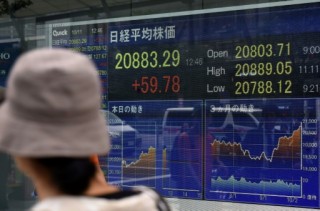Loading
Search
▼ Nikkei Closes at 21-year High
- Category:Other
TOKYO - Tokyo's benchmark stock index closed at a more than two-decade high Wednesday, as the Japanese market rides a global equities rally with its U.S. counterparts hitting fresh records.
The Nikkei 225 rose 0.28 percent, or 57.76 points, to end at 20,881.27, its best finish since December 1996.
The Japanese market closed at levels last seen the year that Prince Charles and Diana divorced, Bill Clinton won his second term as U.S. president and Nintendo launched its Pokemon brand.
Japan Inc has been reporting bumper profits and the world's number-three economy is on an upswing, but the Japanese market has also benefited from a global equities rally that saw Wall Street chalking up more record finishes on the past two weeks.
The Nikkei has rebounded from below the 15,000 mark in June last year after Britain's vote to exit the EU pummelled world markets, while a strong yen hit Japanese exporters.
The index has regained vigor since U.S. President Donald Trump was elected as dealers bet on his plans for big spending and tax cuts.
Japan kicks off its latest earnings season this month while the nation's economy has logged its longest string of quarterly gains in a decade.
The International Monetary Fund upgraded its view of the country's economy on Tuesday, saying it now expects 1.5 percent GDP growth in 2017 and 0.7 percent next year, up from a July projection of 1.3 percent and 0.6 percent respectively.
It cited a pickup in exports and stronger consumer spending.
"The global economy is doing well and hopes for U.S. interest rates are on the rise," said Toshihiko Matsuno, chief strategist at SMBC Friend Securities.
Boosting U.S. borrowing costs tends to strengthen the dollar against the yen, which is good for the profits of Japan's exporting firms.
Japan's currency has weakened over the past few years after Prime Minister Shinzo Abe swept to power on a pledge to resuscitate the once-booming economy with a plan dubbed Abenomics.
The scheme -- a mix of aggressive monetary easing and huge government spending along with reforms to the economy -- fattened corporate profits and sent the stock market higher.
But it has largely failed in the goal of shrugging off the deflation that has plagued Japan for years and held back growth.
"Corporate earnings have risen to the best levels ever," said Hisao Matsuura, chief strategist at Nomura Securities, who added that Abe's growth plan has contributed "a bit".
"It's true that the yen dropped in the past few years" during his tenure, he said.
The Nikkei was below 10,000 when Abe came to power.
But it remains far below a record close of almost 39,000 in the last days of 1989 before a stock and property market bubble collapsed. The index then began a long descent as the once red-hot Japanese economy fell into years of malaise.
© 2017 AFP
The Nikkei 225 rose 0.28 percent, or 57.76 points, to end at 20,881.27, its best finish since December 1996.
The Japanese market closed at levels last seen the year that Prince Charles and Diana divorced, Bill Clinton won his second term as U.S. president and Nintendo launched its Pokemon brand.
Japan Inc has been reporting bumper profits and the world's number-three economy is on an upswing, but the Japanese market has also benefited from a global equities rally that saw Wall Street chalking up more record finishes on the past two weeks.
The Nikkei has rebounded from below the 15,000 mark in June last year after Britain's vote to exit the EU pummelled world markets, while a strong yen hit Japanese exporters.
The index has regained vigor since U.S. President Donald Trump was elected as dealers bet on his plans for big spending and tax cuts.
Japan kicks off its latest earnings season this month while the nation's economy has logged its longest string of quarterly gains in a decade.
The International Monetary Fund upgraded its view of the country's economy on Tuesday, saying it now expects 1.5 percent GDP growth in 2017 and 0.7 percent next year, up from a July projection of 1.3 percent and 0.6 percent respectively.
It cited a pickup in exports and stronger consumer spending.
"The global economy is doing well and hopes for U.S. interest rates are on the rise," said Toshihiko Matsuno, chief strategist at SMBC Friend Securities.
Boosting U.S. borrowing costs tends to strengthen the dollar against the yen, which is good for the profits of Japan's exporting firms.
Japan's currency has weakened over the past few years after Prime Minister Shinzo Abe swept to power on a pledge to resuscitate the once-booming economy with a plan dubbed Abenomics.
The scheme -- a mix of aggressive monetary easing and huge government spending along with reforms to the economy -- fattened corporate profits and sent the stock market higher.
But it has largely failed in the goal of shrugging off the deflation that has plagued Japan for years and held back growth.
"Corporate earnings have risen to the best levels ever," said Hisao Matsuura, chief strategist at Nomura Securities, who added that Abe's growth plan has contributed "a bit".
"It's true that the yen dropped in the past few years" during his tenure, he said.
The Nikkei was below 10,000 when Abe came to power.
But it remains far below a record close of almost 39,000 in the last days of 1989 before a stock and property market bubble collapsed. The index then began a long descent as the once red-hot Japanese economy fell into years of malaise.
© 2017 AFP
- October 12, 2017
- Comment (0)
- Trackback(0)


